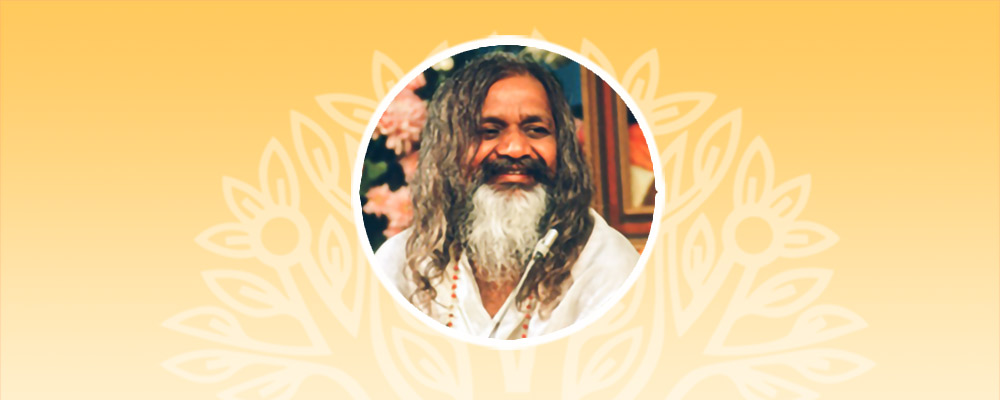In this talk from 1971, TM Founder Maharishi Mahesh Yogi discusses how Self-realization develops a profound basis for fully understanding and appreciating the world around us. Maharishi explains that when the Self is totally dependent on others and the surroundings, life is lived in an unhealthy state of dependence. When the full value of the Self is awakened through the daily practice of the Transcendental Meditation technique, the liberation of the Self enables us to be of maximum value to others and to enjoy life to the fullest.
Bob Roth, CEO of the David Lynch Foundation, joins host Mario Orsatti to discuss Maharishi’s talk, which was recorded at the University of Massachusetts, Amherst.
Maharishi brought the TM technique from India to the West in 1959. Since then, more than 10 million people of all ages, cultures, and religions have learned the technique. In 1963, Maharishi published his seminal book, Science of Being and Art of Living, which was translated into 15 languages. His second book, published in 1967, was Maharishi Mahesh Yogi on the Bhagavad-Gita: A New Translation and Commentary. He wrote many more books and circled the world numerous times, speaking with world leaders and lecturing widely.
Maharishi also inspired a scientific quest for enlightenment. Over 700 published studies on the TM technique have demonstrated its far-reaching benefits—better health and longer life, greater intelligence and creativity, more fulfilling relationships and work success, reduced societal stress, and effortless creation of peace.
This episode of TM Talks was broadcast on October 31, 2021.
Watch highlights from Maharishi’s talk, plus discussion with Bob Roth and Mario Orsatti (51:31)
Maharishi Mahesh Yogi discusses how Self-realization develops a profound basis for fully understanding and appreciating the world around us.
About TM Talks
TM Talks is a weekly series of LIVE webinars, on personal development and the growth of higher states of consciousness, every Sunday at 5:00 p.m. Eastern. Connection details below.
If you can’t watch the livestream, visit TM Talks for videos of all broadcasts.
For a schedule of all upcoming online events, including TM Talks, visit TMEvents.org ►
How to Connect
For best results and video, download the Zoom app to your smartphone, tablet, or computer, then click on this link: https://zoom.us/j/177174913. You will be prompted to install Zoom if it isn’t already on your device. To join the meeting, enter your email address and name at the prompt.
If you prefer to call in for audio only, dial 929-205-6099 or 253-215-8782, then enter the Meeting ID 177-174-913#.


Comments
you may also like
Maharishi
The Goal of Meditation | 15:53
TM Founder Maharishi Mahesh Yogi speaks about the formula for perpetual contentment and unbounded awareness, 24/7. Regular practice of the Transcendental Meditation technique cultivates inner silence and expanded awareness, not just during meditation but throughout the day and night.
Maharishi
Maharishi on the Nature of Enlightenment: Enriching All Aspects of Life | 51:09
TM Founder Maharishi Mahesh Yogi, in a 1971 talk at Humboldt State University, Arcata, California, explains how regular practice of the TM technique promotes the natural development of a person’s full potential. Bob Roth, CEO of the David Lynch Foundation, and host Mario Orsatti discuss highlights from this classic talk. This encore episode first aired on October 3, 2021.
Maharishi
When Our Heart Expands to Maximum Value, We See the World in All Its Glory | 24:13
TM Founder Maharishi Mahesh Yogi explains the difference between the fifth state of consciousness, Cosmic Consciousness, and the sixth state, Glorified Cosmic Consciousness, also sometimes referred to as God Consciousness. Why does it have this name—and what does love have to do with it?
Maharishi
Harmony of Differences and Waves of Bliss—the Most Highly Evolved State of Human Existence | 24:08
In this historic talk from 1970, TM Founder Maharishi Mahesh Yogi explains the growth of the ultimate state of enlightenment: “Unity dominates in perception, in thinking, in action, and this is what is called behaving in Unity—walking and talking and perceiving, experiencing all in terms of Unity.”